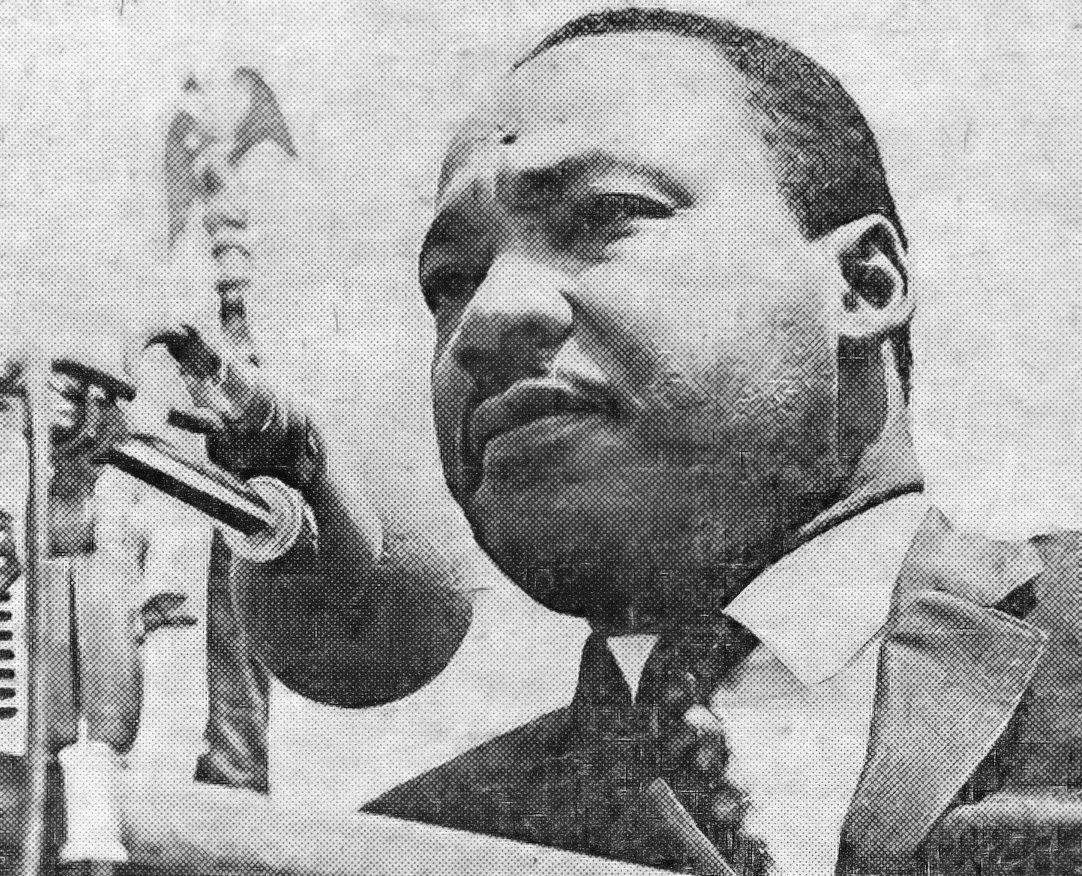Martin Luther King, Jr.’s birthday commemorates the struggle for equality

Martin Luther King Jr. speaks about segregation on campus on April 22, 1965.
By Ryan Miller
Jan. 14, 2011 2:24 a.m.

Franklin D. Murphy, Chancellor from 1960 to 1968, walks with Martin Luther King Jr.
Credit: UNIVERSITY ARCHIVES

Dr. Martin Luther King Jr. speaks in front of a crowd at UCLA in the 1960s.
Credit: UNIVERSITY ARCHIVES
On April 22, 1965, Martin Luther King, Jr. spoke to more than 5,000 UCLA students and faculty.
“We have come a long way, but we have a long, long way to go,” King said at UCLA.
As an American civil rights leader and advocate, King seemed to understand that his dream of seeing a nation free of racial inequality and injustice was not going to be an easy task.
The central theme during the 1950s and 1960s was desegregation at both the federal and local levels, said Brenda Stevenson, history professor at UCLA. Everything from Brown v. Board of Education in 1954, a Supreme Court case regarding equal education rights, to the radical Black Panther group that came about during this period.
“In order for progress to be made on the social frontier between whites and blacks, a leader needed to arise,” Stevenson said. “The role of Martin Luther King was to be that voice for the black community and to be that beacon of hope for a more united people.”
King’s charisma, along with his education and family upbringing, helped him evolve into a leader, Stevenson said. People willing to be outspoken during the era knew that their actions often resulted in harsh consequences, although King was eager to accept the challenge.
Looking back, the level of social desegregation during the days of the Civil Rights Movement improved drastically, said Darnell Hunt, director of the Ralph J. Bunche Center for African American Studies. Schools were no longer separated by race. De jure discrimination, or that which is based on law, was also annulled.
Racial equality within the political sphere was beginning to come to fruition as well. The right to vote and the inclusion of blacks in political offices became a reality in large part because of King’s movement, Hunt said.
“I think that Obama’s victory as president really says a lot about where we have come over the last 40 years,” Hunt said. “It really symbolizes King’s dream of a nation rife with opportunity for everyone, regardless of color.”
Even after King’s death, many of the breakthroughs he made in shattering discriminatory barriers continued to resonate, Hunt said.
“The feminist movement and disability movement, among many, came about in large part because of King’s motivations and struggles,” said Jasmine Hill, Undergraduate Students Association Council President.
However, King’s dream has not been fully reached, Hunt said. Even today, there is still a lot to learn.
“A central issue that came to the forefront during Civil Rights Movement was economics,” Hunt said. “That very little economic progress has been made since the days of Martin Luther King makes his teachings and philosophies equally relevant within today’s society.”
King believed that in order for the nation to be fully integrated, black citizens had to be given fairer labor rights and increased working wages, Hunt said. During many of his later speeches, including the rally in Memphis, Tenn., he spoke at on the day of his assassination, King stressed the workplace environment and economic inequality that persisted during that era.
According to Hunt, not much has really changed over the past 40 years in the area of economics. At present, some issues are worse.
Locally, access to higher education for the less economically privileged is a prevalent issue today, Hill said.
“King believed education was a right that everyone should be entitled to,” Hill said. “Even today, we need to continue to evaluate and challenge ourselves to keep moving in a direction that makes education affordable for any student regardless of economic class.”
Monday marks the birth date of this iconic and pioneering figure in American society. Rather than let the holiday come and pass, a number of students stressed the importance in remembering King’s legacy.
“King understood what was the lowest common denominator, or the most essential focus, of the time,” Hill said. “We need to follow this same approach and really seek out what the next step is in fully uniting different groups.”
Other students feel the holiday’s continuation, despite many of the racial drawbacks still present, says a lot about how things have evolved since the days of Martin Luther King, Jr.
“Commemorating this day, in the truest sense, sends a very powerful message,” said Joelle Gamble, internal public relations coordinator of the Afrikan Student Union and a third-year international development studies student. “Things are heading in a positive direction; we just have to wait.”


